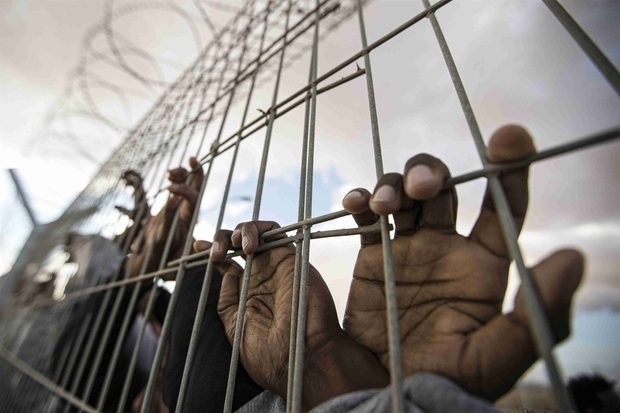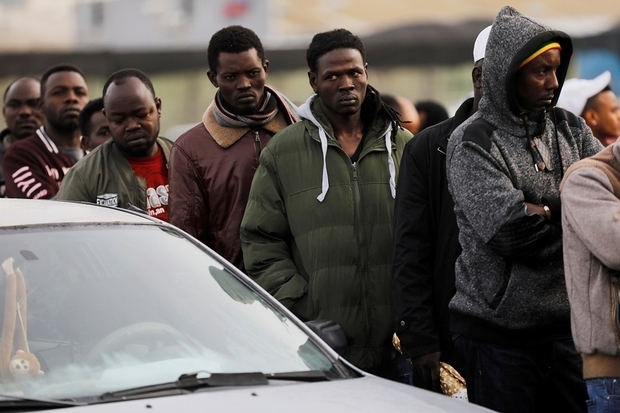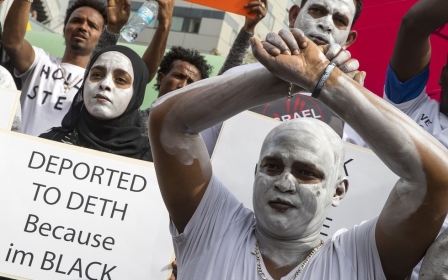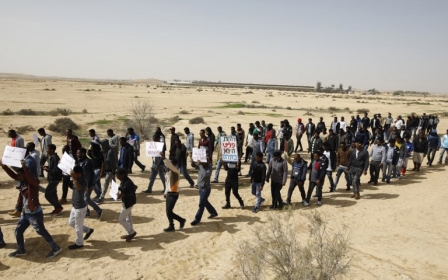African asylum seekers in limbo as Israel considers new relocation plans

The chaos that has followed Israeli Prime Minister Benjamin Netanyahu's announcement on Monday of a landmark plan in conjunction with UN refugee agency UNHCR to relocate African migrants – only to put the deal on hold less than a day later – continued to leave asylum seekers and their defenders in the dark about their fate.
The UNHCR plan was intended to relocate 16,250 African asylum seekers to Western countries, in exchange for granting temporary residency status to an equal number of migrants in Israel. However, Netanyahu's far-right allies emphatically denounced the plan, prompting the prime minister to swiftly backtrack.
The government seemed to be considering reverting to its previous highly contested plan to give some 38,000 undocumented African migrants the choice between indefinite imprisonment with eventual forced expulsion, or a $3,500 payment and a plane ticket back to their home countries or to a third-party African state.
Meanwhile, Uganda, which was widely understood to be the second African country with which Israel had struck an agreement to receive African migrants, has repeatedly denied having any formal or informal understanding with Israel on the topic – in spite of reports dating as far back as 2013 that a deal had been made for Uganda to accept migrants in exchange for modest sums of money.
The Jerusalem Post went on to report that if a suitable alternative to Rwanda was not found, some asylum seekers who had been detained would be released from prison – a scenario that seems unlikely to be positively received by Israel’s influential far-right parties.
On Wednesday, the government released a small group migrants from detention after the collapse of an international deal to send them to Rwanda.
Some 200 additional migrants are still being held at the Saharonim detention centre in southern Israel awaiting possible deportation to Uganda but their fate depends on whether an Israeli envoy who visited the east African state on Wednesday had managed to secure a deal for them to be taken in.
In the event agreement is not reached, they too will be freed, probably on Thursday. The long-term fate of the freed migrants was unclear but Netanyahu said he was seeking a new relocation deal, although he gave no details.
'Illegal infiltrators'
The migrants' presence in Israel has become a political issue, with Netanyahu having referred to them in the past as "not refugees but illegal infiltrators", and blaming them for posing a threat to Israel’s social fabric and Jewish character.
Education Minister Naftali Bennett, who hails from the far right Jewish Home party, had blasted the deal with UNHCR on social media as a “complete capitulation” which would "turn Israel into a paradise for infiltrators.”
Israel’s deportation plan to Africa had been denounced by rights groups and asylum seekers alike, as Hotline for Refugees and Migrants, an NGO based in Israel, found that hundreds of African asylum seekers deported "willingly" from Israel had died in torture camps in Libya or drowned at sea.
Rights groups advocating on behalf of migrants had challenged the deportation plan in front of Israel's Supreme Court, which on 15 March issued a temporary order that froze its implementation.
Observers have been left guessing as to what could have pushed Netanyahu to put himself in such a quagmire.
Haaretz columnist Yossi Verter speculated on Wednesday that the aim of announcing the UNHCR deal may have been to help the prime minister “win points with the judicial system” by publicly siding with the Supreme Court’s stance on forced expulsions, only to later blame Israeli public outrage to back out of the agreement. Netanyahu and Interior Minister Aryeh Deri are facing several corruption charges.
“Perhaps they wanted to signal to the judicial system that they are the responsible adults, capable of taking decisions that are contrary to their own interests and to the emotions of their voters,” Verter wrote.
Lives in limbo
Simultaneously, Netanyahu blamed liberal NGO the New Israel Fund (NIF) on Tuesday for torpedoing the deportation agreement with Rwanda, an accusation the group has denied.
Netanyahu said he had called for a parliamentary inquiry into the organisation for “jeopardis(ing) the security and future of the State of Israel as the country of the Jewish people”.
“(Netanyahu) lashes out to deflect attention from his own morally bankrupt choices,” NIF CEO Daniel Sokatch said in a statement on Tuesday.
“This week, for a brief moment, we celebrated a victory for the 37,000 people who are seeking asylum in Israel and who deserve the right to live their lives and raise their families in peace. Then the Prime Minister backtracked, leaving their lives in limbo. And now he’s blaming us.”
A number of Israeli and foreign Jews have pointed out the disturbing irony of Netanyahu scrapping a plan for asylum seekers in the middle of the Jewish holiday of Passover, which commemorates the Biblical exodus of Israelites from ancient Egypt.
Some supporters of NIF and asylum seekers have shared pictures on social media with the hashtag #NoMoreMaror, in reference to the bitter herb consumed during Passover seders as a symbol of the bitterness of slavery and exile.
According to Interior Ministry figures, there are currently some 42,000 African migrants in Israel, half of them children, women or men with families who are not facing immediate deportation.
Some migrants have lived in Israel for years and work in low-paying jobs that many Israelis shun. Israel has granted asylum to fewer than one percent of those who have applied and has a years-long backlog of applicants.
Many migrants say they came to Israel to seek asylum after fleeing persecution, conflict, and in the case of Eritreans, forced, lifelong conscription to its army. But Israeli authorities regard them as economic migrants.
Most arrived in Israel in the second half of the last decade, crossing from Egypt before the route was sealed. Israel uses the term "infiltrators" to describe people who did not enter the country through an official border crossing.
A fence Israel has built over the past few years along its border with Egypt has all but stopped African migrants from entering the country illegally. Since 2005, a total of 64,000 Africans had made it to Israel, although thousands have since left.
New MEE newsletter: Jerusalem Dispatch
Sign up to get the latest insights and analysis on Israel-Palestine, alongside Turkey Unpacked and other MEE newsletters
Middle East Eye delivers independent and unrivalled coverage and analysis of the Middle East, North Africa and beyond. To learn more about republishing this content and the associated fees, please fill out this form. More about MEE can be found here.






